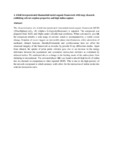Please use this identifier to cite or link to this item:
https://cris.library.msu.ac.zw//handle/11408/1862| Title: | A 4-fold interpenetrated diamondoid metal-organic framework with large channels exhibiting solvent sorption properties and high iodine capture | Authors: | Mehlana, Gift Ramon, Gaëlle Bourne, Susan A. |
Keywords: | Interpenetration, iodine capture, vapochromism, desolvation | Issue Date: | 2016 | Publisher: | Elsevier | Series/Report no.: | Microporous and Mesoporous Materials;Vol. 231; p. 21-30 | Abstract: | The characterisation of a 4-fold interpenetrated diamondoid metal-organic framework (MOF) {[Ni4(44pba)8]∙sol}n, (1) (44pba = 4-(4-pyridyl)benzoate) is reported. The compound was prepared from Ni(II) and 44pba under solvothermal conditions. When activated to give 1d, the compound absorbs a wide range of solvents which is accompanied by a visible colour change. Sorption of water triggers an irreversible phase transformation, while adsorption of methanol, ethanol, benzene, dimethylformamide and cyclohexanone does not affect the structural integrity of the framework as revealed by powder X-ray diffraction studies. Apart from ethanol, the uptake of polar protic solvents gave rise to an increase in the energy difference between the asymmetric and symmetric carboxylate stretches as confirmed by infrared studies. We attributed this to a change in the binding mode of the carboxylates from chelating to monodentate. The activated phase (1d) was found to absorb high levels of iodine into its channels in comparison to other reported MOFs. This is due to the high porosity of the network compound in which aromatic walls allow for the interaction of iodine molecules with the framework walls | URI: | https://www.researchgate.net/publication/303182630 http://www.sciencedirect.com/science/article/pii/S1387181116301688 http://hdl.handle.net/11408/1862 |
ISSN: | 1387-1811 |
| Appears in Collections: | Research Papers |
Show full item record
Items in MSUIR are protected by copyright, with all rights reserved, unless otherwise indicated.




